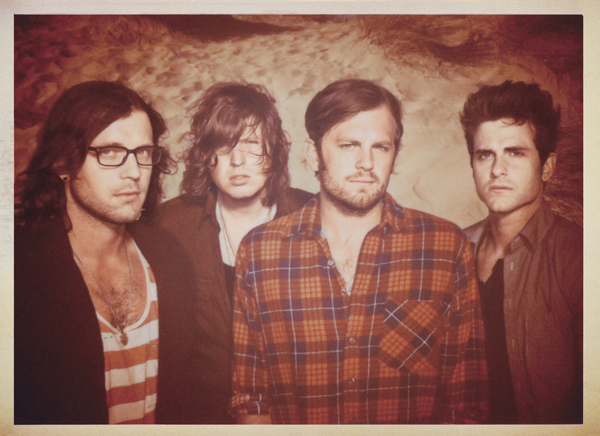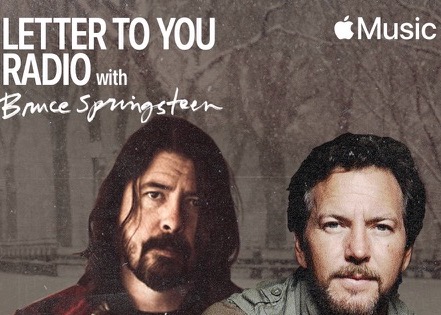Videos by American Songwriter
Click here to purchase current issue.
It is late September and brothers Nathan, Caleb and Jared Followill and their cousin Matthew Followill are en route to play a make-up gig at St. Louis’s Verizon Wireless Amphitheatre. Their last show here, in late July, didn’t go exactly as planned. In fact, if VH1 were to ever produce another vacuous music countdown program titled something like “The Most Bizarre and Embarrassing Rock Concerts of All-Time,” the Kings of Leon’s last performance here would top the list. But don’t blame the band; blame a flock of incontinent pigeons that, during their live performance, bombarded the group with a fusillade of bird turd.
Jared, the bassist and youngest Followill, got it the worst and by the third song, “Taper Jean Girl,” had walked off stage. “Thankfully it didn’t get in my mouth,” says Jared, debunking erroneous media reports. “But it got awfully close.”
“When I saw the story on the CNN ticker,” Nathan, the oldest Followill, says kidding around, “I knew we had finally found success in America. But now every time someone googles ‘The Kings of Leon,’ the words ‘pigeon shit’ are always going to come up.”
There are good reasons why the Kings of Leon can now laugh off this avian poo episode: For one thing, over the last two years, the Nashville-based quartet have accomplished more than most bands will in a lifetime. The astronomical success of their 2008 album Only By The Night is, in this age of illegal music pilfering, a near-extinct commodity: a certified blockbuster by an American rock and roll band. It sold a jaw-dropping six million copies and earned four Grammys, including one for Record of the Year for the ubiquitous angst anthem “Use Somebody,” and another for the throbbing sing-along “Sex on Fire.”
The Kings of Leon have much deeper doo-doo they could potentially step in. Tonight’s make-up show in St. Louis marks the last stop of a successful summer tour playing to roughly 20,000 fans a night. The next date colored in red on the band’s iPhone calendar app is October 19th and just over three weeks away. It’s not a concert date, but the street date for Come Around Sundown, the band’s fifth full-length studio album. And right now there is a rather large, anxiety-inducing (and exceedingly assonant) question hanging over the band: How in the hell will the Followills follow-up?
They will do a few minor cosmetic things like change up the production process and leave the creature comforts of Blackbird Studios in their hometown of Nashville for a big time New York facility. Their usually intensive pre-production process will be cut back and the collaborative jam-it-out songwriting process will leave Caleb writing lyrics on the fly in the studio. “I didn’t write any lyrics,” says Caleb, during his recent interview at Next BIG Nashville. “I just went in and said stuff at the top of my head. We would just make up songs as we went. I wouldn’t suggest anyone do it… but it did work.”
But the real answer to how this relatively young band will handle the pressure of following up the biggest album of their career lies deeper. It’s in the tangled strands of the Followills’ shared DNA, hidden in the subcutaneous recesses of their collective psyches.
The Kings of Leon’s family history is a perfectly formed rock and roll legend, like Robert Johnson at the crossroads or Jimmy Page’s black magic sorcery. But the Kings’ story is pure Americana, a Southern Gothic Flannery O’Connor or William Faulkner bildungsroman – with one glaring exception: it is all true. The utter disbelief their story engenders prompted one British publication to offer the Kings free genetic testing to prove their fraternal bloodlines.
The story begins with a dark maroon 1988 Oldsmobile. In the driver’s seat is an itinerant Pentecostal preacher named Ivan Leon Followill. He has a gift: the ability to rain fire and brimstone upon the faithful, bringing them to their knees and tears. Sitting shotgun is Betty Ann, Ivan’s piano-playing, gospel-singing wife. Splayed across the backseat is the eldest son Nathan, middle boy Caleb, and Jared, usually asleep on the floorboards. The Pontiac racks up miles upon miles, crisscrossing the Deep South and beyond from Louisiana church services to Mississippi tent revivals to holy-roller confabs in Sooner country.
The boys, who were partially home schooled by Betty Ann, were deprived of (or perhaps liberated from) secular sinner culture – no Beatles or Dylan, no Biggie Smalls or Metallica; no Saved By The Bell or Ferris Bueller’s Day Off. But within this vacuum-sealed religious bubble, where even short pants were deemed sinful, the boys somehow managed to thrive. “Preachers in the Christian communities are like rock stars,” Angelo Petraglia, the boys’ longtime collaborator and producer, explains. And the Followill boys didn’t hesitate to use their elevated status to rejoice in the gifts of the sacrament with the young maidens of Christendom.













Leave a Reply
Only members can comment. Become a member. Already a member? Log in.